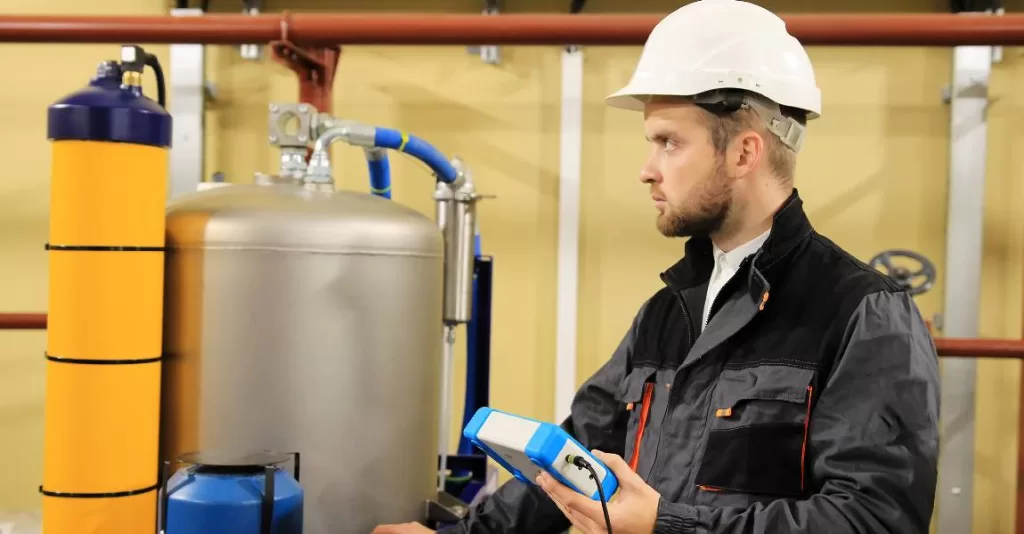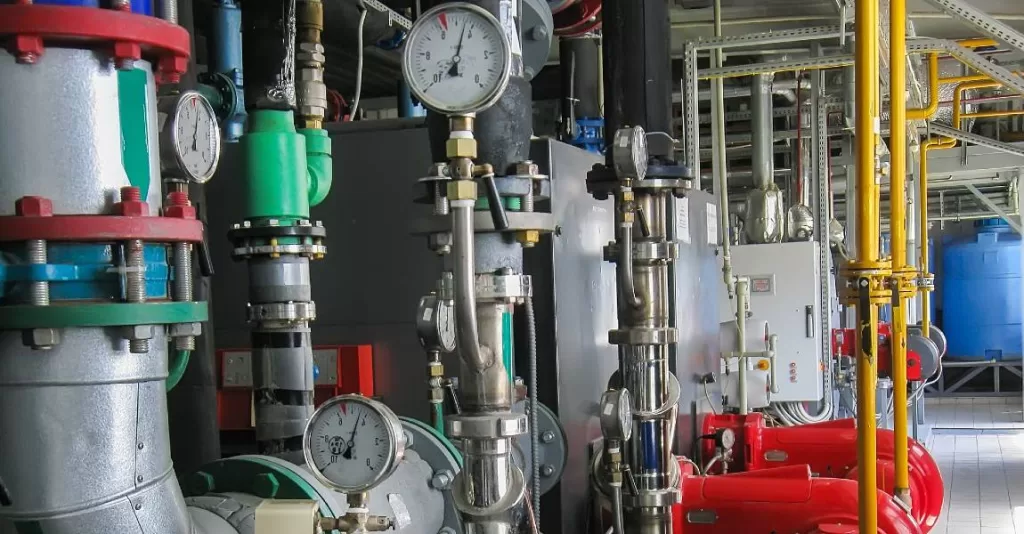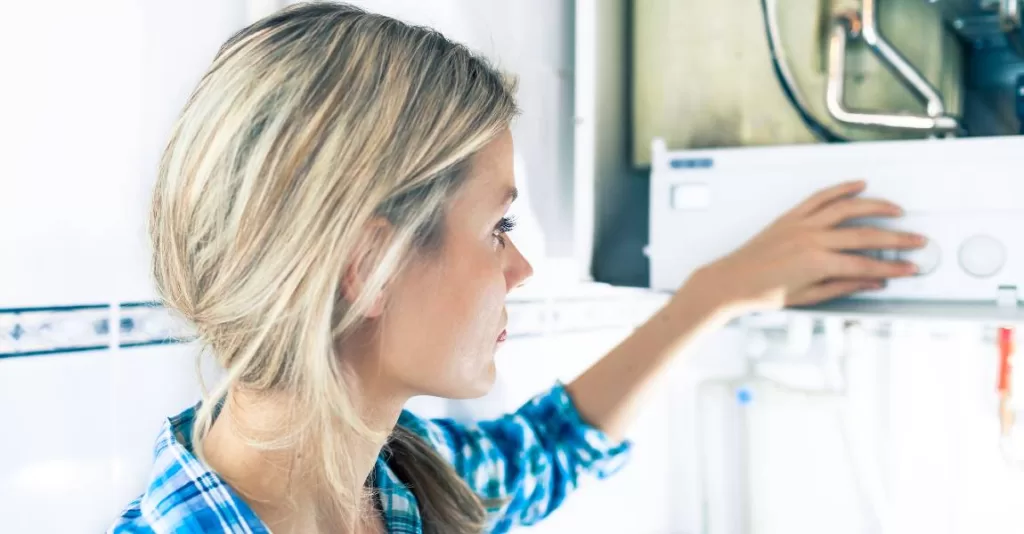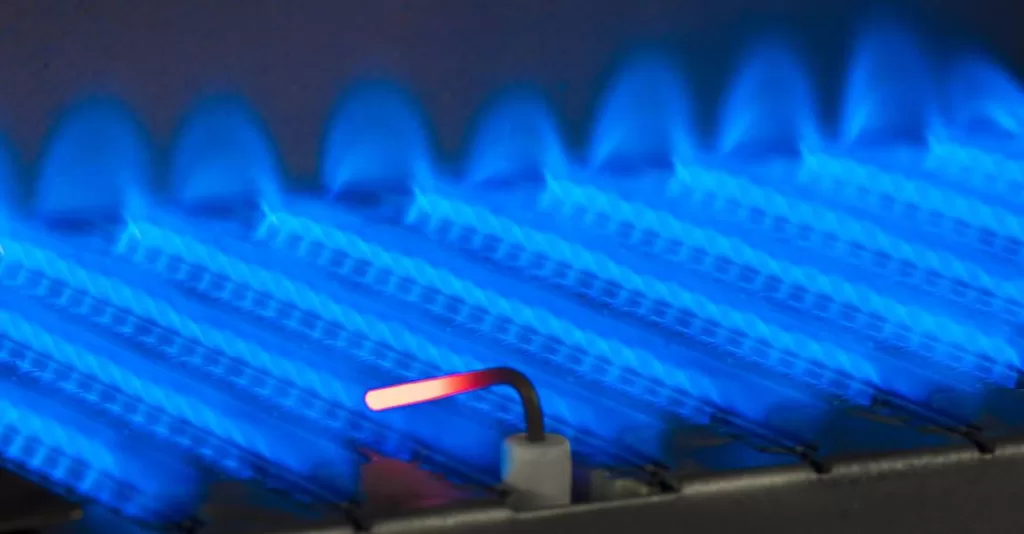Understanding what are the 7 Different Types of Boilers and their uses can help you make an informed decision about heating your space.
When heating your home or business, boilers are a popular choice. But did you know that there are several different types of boilers available?

Table of Contents
What is the Definition of a Boiler?
A boiler is a closed vessel or container that generates steam or heat water for various industrial, commercial, or residential purposes. It is a common heating system in buildings, factories, power plants, and other facilities. The primary function of a boiler is to transfer heat energy from a fuel source to water or steam, which is then circulated throughout the system to provide heat or power.
Various sources, such as natural gas, oil, coal, or biomass, can fuel boilers. They are designed to efficiently convert fuel into usable heat energy, making them essential for heating, hot water production, and industrial processes that require steam or hot water.
Boilers come in different types, sizes, and designs, but all operate on the same basic principle of heating water or generating steam through combustion or other heat transfer methods.
What are the 7 Different Types of Boilers?
- Electric
- Natural Gas
- Oil
- Steam
- Condensing
- Combo
- Hot Water
Boilers are essential heating systems that provide warmth and hot water for residential and commercial buildings.
There are 7 different types of boilers, each with unique features and benefits.
What are the 7 Different Types of Boilers?
Electric Boilers
These boilers use electricity to generate heat and are a popular option for those who don’t have access to a natural gas supply. They are efficient, compact, and easy to install, making them suitable for small spaces.
Natural gas boilers
Natural gas boilers are the most commonly used type of boiler. They burn natural gas to produce heat, making them cost-effective and environmentally friendly. They are known for their efficiency and reliability.

Steam boilers
Steam boilers use water to generate steam, which is then circulated to provide heat. They are commonly used in industrial settings and are known for their high heating capacity. Steam boilers require careful monitoring and maintenance to ensure optimal performance.
Condensing boilers
Condensing boilers are highly efficient and utilize heat from exhaust gases to preheat cold water entering the boiler. This results in lower energy consumption and reduced fuel costs. They are ideal for those looking for energy-efficient heating solutions.
Combination boilers (combi)
Combination boilers are a space-saving option that combines both a water heater and a central heating boiler in one unit. They provide hot water on demand and are popular in smaller homes or apartments where space is limited.
Hot water boilers
Hot water boilers heat water and distribute it throughout a building to provide heating and hot water. They are commonly used in larger residential and commercial buildings and can be fueled by natural gas, oil, or electricity.
Oil Fired boilers
Oil boilers burn heating oil to generate heat. They are commonly used in areas without access to natural gas and are known for their reliability and extremely energy efficiency.
In conclusion, understanding What are the 7 Different Types of Boilers?, such as electric, natural gas, steam, condensing, combo, hot water, and oil, allows individuals and businesses to choose the most suitable heating system for their specific needs and requirements.
From energy efficiency to space-saving capabilities, each type of boiler offers unique advantages to ensure comfortable and efficient heating.
What is a Traditional Boiler?
A traditional boiler is a type of heating system that uses a tank or cylinder to store and heat water. This heated water is distributed throughout the building to provide heat for radiators, underfloor heating, or hot water taps.
Traditional boilers are commonly found in older homes or buildings that have not been updated with more modern heating systems. They operate on the principle of heating water through the combustion of fossil fuels, such as gas or oil.
Traditional boilers include systems like the conventional boiler, which uses a separate hot water cylinder, and the system boiler, which incorporates the heating and hot water components within a single unit.
These boilers require regular maintenance and can be a less energy-efficient option compared to newer, more eco-friendly heating systems like condensing boilers or heat pumps.
What is a Conventional Boiler?
A conventional boiler, a regular boiler, or a traditional boiler is a type of central heating system commonly found in older homes. It works by heating water in a large hot water storage tank and distributing it throughout the house via a network of pipes and radiators. This type of boiler requires a separate hot water cylinder to store the heated water and a cold water tank to supply the boiler. A conventional boiler is typically fueled by gas, oil, or electricity.
For example, a homeowner with a conventional boiler may have a large water tank in their attic or basement that stores hot water for showers, baths, and taps. The boiler would be located in a separate area, such as a utility room or garage, and heat the water before sending it to the storage tank. The heated water is then distributed to radiators throughout the house, providing warmth and comfort.

While conventional boilers have been widely used in the past, they are gradually being replaced by more efficient and compact boiler systems, such as combi boilers or system boilers. These newer options eliminate the need for a separate hot water cylinder and cold water tank, making them more space-saving and convenient. However, conventional boilers are still found in many homes, particularly in older properties without central heating system upgrades.
What is a Heat Only Boiler?
A heat-only boiler, also known as a regular or conventional boiler, is used to provide heating for a home or building. It works by heating water in a central heating system, which is then distributed through radiators or underfloor heating systems to warm up the space.
Unlike a combination boiler, a heat-only boiler does not provide hot water on demand and requires a separate hot water cylinder to store and heat water for domestic use. This type of boiler is commonly found in older properties or larger homes with multiple bathrooms, where there is a higher demand for hot water.
Examples of heat-only boilers include brands like Worcester Bosch, Vaillant, and Ideal. These boilers are known for their reliability and efficiency in providing consistent home heating.
What is a Water Tube Boiler?
A water tube boiler is a type of boiler that utilizes water-filled tubes to generate steam. Unlike traditional fire tube boilers, where hot gases pass through tubes surrounded by water, watertube boilers circulate water inside the tubes, which are heated externally by hot gases. This design allows for a higher heat transfer efficiency, as the large surface area of the tubes enables faster and more efficient heat exchange.
Water tube boilers are commonly used in power plants and industrial settings where high-pressure steam is required. They offer several advantages, including faster steam generation, better control over steam pressure, and the ability to handle higher steam capacities.
Water tube boilers are known for their reliability, efficiency, and versatility in various applications.
What’s the Definition of a System Boiler?
A system boiler is a type of boiler that provides heating and hot water to a property. It is designed to meet the hot water demand of a household by heating water and storing it in a hot water tank.
The hot water tank acts as a reservoir, ensuring a constant hot water supply is readily available for use. This is especially useful for larger households or properties with higher hot water demands, as it eliminates the need for individual water heaters in each bathroom or kitchen.
The system boiler works by heating water in a central heating system and then distributing it to various outlets, such as taps and showers, through a network of pipes. It is an efficient and convenient solution for meeting the hot water needs of a household while providing reliable heating throughout the property.

What is an Energy Efficient Boiler?
An energy-efficient boiler is a heating system designed to minimize energy consumption and reduce carbon emissions. It is a more sustainable and environmentally friendly option compared to traditional boilers.
Here are some bullet points to further explain what an energy-efficient boiler is:
- Energy-efficient boilers are designed to maximize the use of heat energy and minimize heat loss. They are equipped with advanced technologies and features that improve their efficiency.
- These boilers have a high-efficiency rating, typically above 90%, which means they convert a more significant proportion of the fuel they consume into usable heat.
- They utilize condensing technology, which allows them to extract heat from the flue gases that would otherwise be wasted in traditional boilers.
- Energy-efficient boilers often have improved insulation and are designed to prevent heat loss, ensuring that the generated heat is effectively utilized and not wasted.
- They may incorporate features such as modulating burners and programmable thermostats, which allow for better control of heating output and temperature regulation. This helps to optimize energy usage and reduce energy wastage.
- Some energy-efficient boilers are compatible with renewable energy sources, such as solar panels or heat pumps, allowing for even more significant energy savings and lower carbon emissions.
- By using less energy, energy-efficient boilers can help homeowners and businesses save on their energy bills and reduce their overall energy costs.
- These boilers contribute to a greener environment by reducing carbon emissions, as they operate more efficiently and produce fewer greenhouse gases than traditional boilers.
- Energy-efficient boilers often come with warranties and incentives from manufacturers and government programs, making them a financially attractive option for homeowners and businesses.
- Investing in an energy-efficient boiler benefits the environment, reduces energy costs, adds value to a property, and improves its energy efficiency rating.
What is Condensing Boiler Technology?
Condensing boiler technology refers to a type of boiler designed to extract more heat from combustion gases than traditional boilers. This is achieved by using a larger heat exchanger and recovering heat from the flue gas that would usually be wasted. As a result, condensing boilers are more energy-efficient and can significantly reduce fuel consumption and greenhouse gas emissions.
What is Combi Boiler Technology?
Combi boiler technology combines a high-efficiency water heater and a central heating boiler in a single unit. This technology allows for simultaneous hot water production for domestic use and heating for the entire home.
Combi boilers are known for their compact size, energy efficiency, and convenience, as they eliminate the need for separate water heaters and boilers, saving space and reducing energy consumption.
Conclusion What are the 7 Different Types of Boilers
In conclusion, What are the 7 Different Types of Boilers are available, each with unique features and advantages. Whether you need a boiler for residential or commercial use, there is a type of boiler that will suit your needs.
The options are vast from conventional boilers to combi boilers, system boilers to biomass boilers. When selecting a boiler, it is essential to carefully consider your requirements, budget, and energy efficiency goals.
By understanding What are the 7 Different Types of Boilers and their benefits, you can make an informed decision that will provide you with reliable heating and hot water for years.
If you need a new boiler or have any questions about which type of boiler is right for you, don’t hesitate to contact our team of experts. We are here to help you find the perfect solution for your heating needs. Call us today for a consultation, and let us assist you in selecting the best boiler for your home or business.





